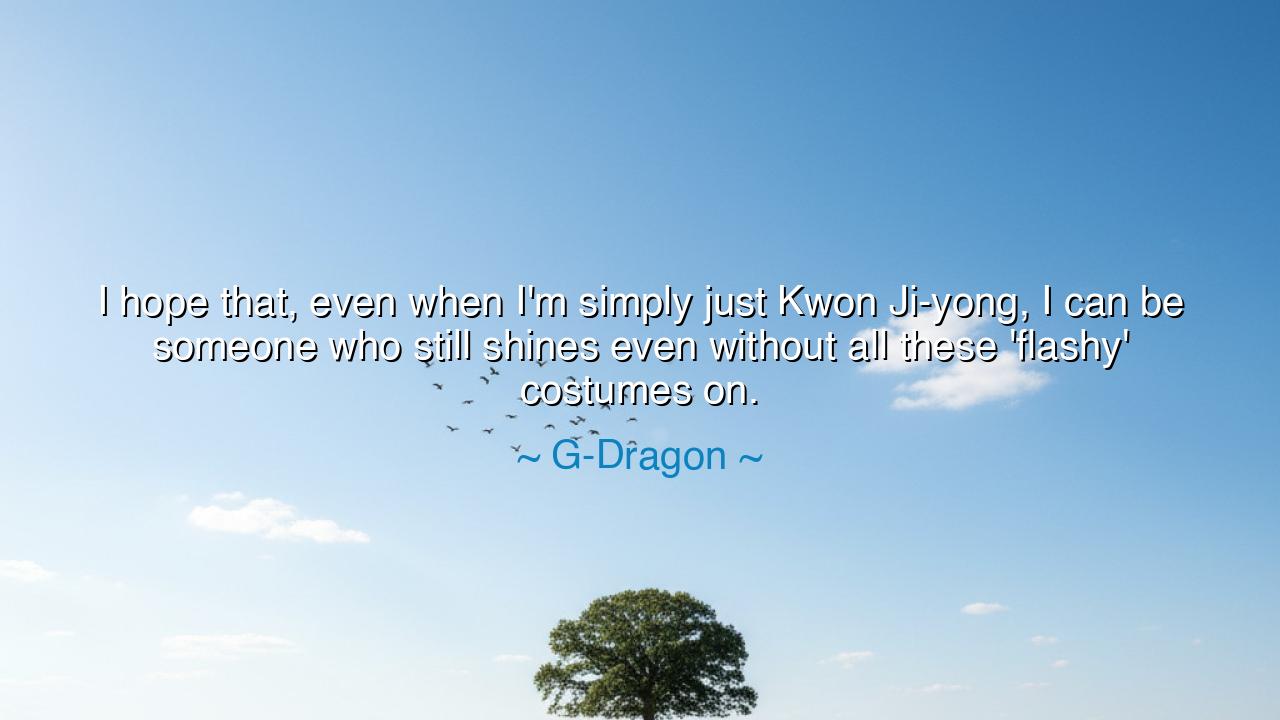
I hope that, even when I'm simply just Kwon Ji-yong, I can be
I hope that, even when I'm simply just Kwon Ji-yong, I can be someone who still shines even without all these 'flashy' costumes on.






The artist and visionary G-Dragon, known to the world as one of Korea’s most influential musicians and cultural icons, once said: “I hope that, even when I’m simply just Kwon Ji-yong, I can be someone who still shines even without all these ‘flashy’ costumes on.” These words, though spoken softly, hold the weight of a man who has looked beyond fame, beyond glitter, and into the heart of existence itself. For what he expresses is the eternal desire of every soul—to be seen not for the mask, but for the light that lies beneath it. In this reflection, G-Dragon speaks not only as an artist, but as a philosopher of identity, reminding us that true brilliance comes not from adornment, but from authenticity.
To “shine without the flashy costumes” is to ask a question older than civilization itself: Who am I, when all is stripped away? The ancients, too, pondered this mystery. Kings once laid down their crowns at night and wondered if the man beneath the gold was still worthy. Warriors who were hailed as heroes questioned if courage still lived within them once the battle had ended. And so it is with the artist: when the music fades, the audience departs, and the lights grow dim—does the self still shine? G-Dragon’s longing is not for applause, but for wholeness—for the assurance that his worth is not bound to fame, but rooted in the quiet dignity of being Kwon Ji-yong, the man behind the legend.
The origin of these words comes from a moment of introspection in G-Dragon’s journey. Having risen to worldwide acclaim as the leader of BIGBANG, he stood among the most dazzling figures in modern music. Yet, amid the glory, he began to sense the burden of the image he had created—an image of perfection, power, and style that the world demanded. In interviews, he confessed that sometimes the persona of “G-Dragon” felt like armor—glittering, beautiful, but heavy. His words were born of a yearning to be seen without disguise, to be loved not as an idol, but as a human being. It is the voice of an artist who has learned that the soul’s true light does not come from the stage, but from the sincerity of the heart.
In this, his wisdom mirrors that of countless others who have walked the same path of fame and self-realization. Consider Prince Siddhartha, who lived amidst luxury and splendor, yet found no peace until he left his palace to seek enlightenment as a simple man. Stripped of his royal garments, he became Buddha, the awakened one—his light shining not through gold, but through truth. Or recall Freddie Mercury, whose stage persona blazed with theatrical brilliance, yet whose greatest song, “Who Wants to Live Forever,” came from the quiet yearning of a man who simply wanted to be loved for his soul. Like them, G-Dragon’s reflection is not a rejection of art or fame—it is a revelation that authenticity outlasts appearance, and that the truest form of beauty is sincerity itself.
To shine without costumes also means to accept vulnerability. The world teaches us to cover ourselves with symbols of success—titles, possessions, reputations—but these are only temporary garments. When the storms of life come, the costumes fall away, and only character remains. The ancient stoics called this the “inner citadel,” the unshakable strength of self that no misfortune can destroy. G-Dragon’s wisdom urges us to cultivate that inner light—to live in such a way that even when stripped of wealth, fame, or beauty, we still radiate peace, kindness, and confidence. For only then can our light endure beyond circumstance.
His words also remind us of the quiet courage it takes to be oneself in a world of illusion. To walk without costume is to walk without armor, exposed before the eyes of others. It means choosing authenticity over acceptance, truth over applause. Yet those who dare to live this way inspire others more deeply than any performance ever could. For in revealing their true selves, they give permission for others to do the same. G-Dragon’s hope—to shine as Kwon Ji-yong—is not selfish; it is universal. It is a wish for all who wear masks to remember that beneath the disguise, there is already light.
So, my child, take this lesson into your heart: do not mistake your costume for your essence. The world will praise your appearance, your success, your titles—but these things are fleeting. What endures is the goodness you cultivate, the kindness you give, and the truth you live. Let your work, your art, your words be expressions of who you are, not substitutes for it. When you can stand before the world naked of pretense and still shine, then you have found true freedom.
For in the end, as G-Dragon teaches, the goal of life is not to build a brighter stage—but to keep the soul’s flame burning even when the lights go out. Shine, not because the world is watching, but because light is what you are.






AAdministratorAdministrator
Welcome, honored guests. Please leave a comment, we will respond soon